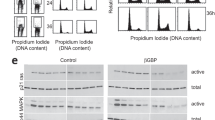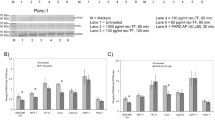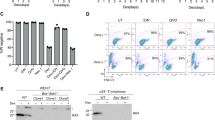Abstract
The effects of tumour necrosis factor-alpha (TNF alpha) on the growth and DNA synthesis of the human breast cell line, T47D, were studied. A dose-dependent, reversible inhibition of thymidine incorporation and cell growth was observed in the range of 0.1 ng ml-1 to 100 ng ml-1 of TNF alpha. Cell viability was not impaired in any of the experiments. Flow-cytometric DNA analysis demonstrated that after 24 h exposure to TNF alpha, T47D cells accumulated in the G1 phase of the cell cycle, and were depleted in the G2/M and S phases, suggesting a block in the progression of the G1/S transition. The involvement of protein kinases (PK) and protein phosphatases in TNF alpha-induced signal transduction was also investigated. A transient and rapid 2-fold increase in total cellular protein kinase C (PKC) activity was detected after 10 min exposure to TNF alpha. To study the role of the observed PKC activation in the cytostatic effect of TNF alpha, T47D cells were exposed to the cytokine in the presence of the potent PKC inhibitor, H7. The inhibitory effect of TNF alpha on thymidine incorporation was not affected by exposure to H7 at concentrations sufficient to block the stimulation of thymidine up-take induced by the PKC agonist, phorbol-12-myristate-13-acetate (PMA). The involvement of other signalling pathways was addressed using the cyclic nucleotide-dependent PK inhibitor, H8; the calmodulin-dependent PK inhibitor, W7; and the inhibitor of protein phosphatases PP1 and PP2B, okadaic acid. Exposure of T47D cells to these enzyme inhibitors failed to antagonise the inhibition of thymidine incorporation by TNF alpha. Taken together, these results indicate that the cytostatic effect of TNF alpha on T47D cells occurs at the G1/S transition of the cell cycle, and is mediated by an intracellular pathway which does not involve the activity of protein kinases C and A, nor protein phosphatases PP1, PP2B.
This is a preview of subscription content, access via your institution
Access options
Subscribe to this journal
Receive 24 print issues and online access
$259.00 per year
only $10.79 per issue
Buy this article
- Purchase on Springer Link
- Instant access to full article PDF
Prices may be subject to local taxes which are calculated during checkout
Similar content being viewed by others
Author information
Authors and Affiliations
Rights and permissions
About this article
Cite this article
Pusztai, L., Lewis, C. & McGee, J. Growth arrest of the breast cancer cell line, T47D, by TNF α; cell cycle specificity and signal transduction. Br J Cancer 67, 290–296 (1993). https://doi.org/10.1038/bjc.1993.55
Issue Date:
DOI: https://doi.org/10.1038/bjc.1993.55
This article is cited by
-
Accumulation of an inactive form of p53 protein in cells treated with TNFα
Cell Death & Differentiation (2002)



